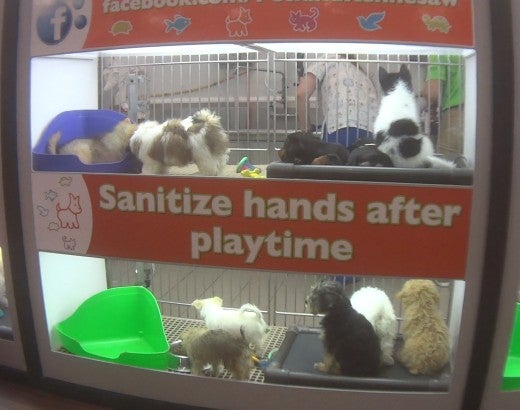A recent industry publication paints a grim picture for the future of puppy mills, after several hundred localities and three states have banned the sale of puppies in pet stores in recent years. According to a report from IBIS World, a market research firm, fewer pet stores selling puppies led to a 12.2% revenue decline for commercial puppy breeders in 2017, with continued declines expected for the foreseeable future.
This is great news, and it shows that our broad and tough-minded campaign against puppy mills is paying off.
Importantly, the authors of the report note a year-to-year reduction in the number of kennels raising puppies, and attribute that directly to the poor reputation the commercial pet breeding industry has earned for itself.
The research also directly contradicts industry lobbyists and trade groups, who have downplayed the effect that humane pet store ordinances have had on puppy mills. But anyone with a basic understanding of economics knows that when you shrink the marketplace, production has to shrink as well. With fewer outlets selling mill puppies, greedy dog mills churn out fewer puppies. Meanwhile, responsible breeders, who breed sparingly and never sell to puppy stores, will still be able to keep breeding healthy animals in caring home environments. That’s how it ought to be.
The animals trapped in puppy mills are often denied adequate food, water and even the most basic veterinary care or enrichment. They will almost never know a kind human touch. Every year, we witness this cruelty dozens of times first-hand, when we assist with puppy mill rescues or help shelters flooded with puppy mill animals after a rescue. The animals we see are often emaciated, many suffer from untreated diseases and infections, and often their spirits are broken. While dogs are incredibly resilient and many of those we rescue bounce back after weeks of TLC, no animal should have to endure such misery in the first place.
That’s why we fight puppy mills so hard, and work with such energy to end them. We have been the driving force behind successful bans on puppy mill sales in pet stores in the states and localities, and we are pushing others to do the same. We are also working to advance the passage of bills in Congress that would regulate puppy mills. Last week, we released our eighth annual Horrible Hundred report, which lists problem puppy breeders and sellers in the United States. Our researchers work tirelessly all year, scouring state and U.S. Department of Agriculture inspection reports to pull this information together so lawmakers and consumers are aware of puppy mill cruelty wherever it exists.
Through our undercover investigations of Petland, the largest national chain that still sells puppies, and that often sources animals from puppy mills, we have focused attention on how pet stores contribute to and exacerbate the puppy mill problem. In fact, several of the puppy mills featured in this year’s Horrible Hundred report sell to Petland. One breeder in Clark, Missouri, who supplied puppies to at least five Petland stores in Florida, was keeping his dogs in enclosures with excessive feces. The animals had dirty and matted fur and the breeder even sold dogs without the proper vaccinations. Another breeder in Middlebury, Indiana, who supplied to a Petland in Olathe, Kansas, had a wheaten terrier with a softball-sized vaginal prolapse. The breeder had reportedly known about this condition for six weeks but had not notified a veterinarian. A prolapse is painful and, if left untreated, can be fatal.
The news that this cruelty is on a decline is exciting, and satisfying, but we cannot stop now. Soon after the coronavirus crisis began, our investigators documented a surge in sales at puppy-selling pet stores. This is especially unfortunate, given that shelters around the country are receiving more surrendered animals and need folks to foster and adopt as this crisis continues. Responsible breeders, shelters and rescues should be the only sources for a new pet. To truly get the problem of puppy mills under control, we will need each animal-loving American on our side, keeping an eye out for puppy mill abuse, raising their voices in support of laws that regulate puppy mill excesses, and helping members of the broader public to make the right decisions when they decide to bring a companion animal home.



